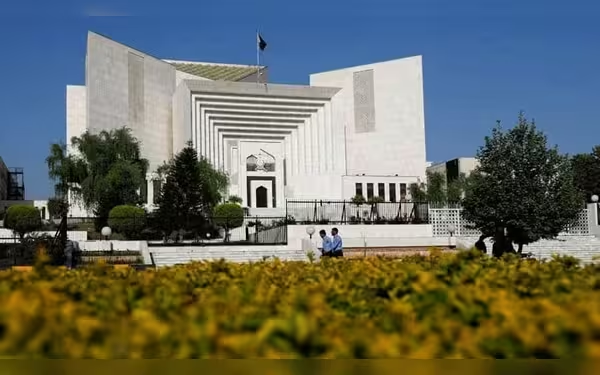Saturday, November 16, 2024 05:44 PM
CJP Isa Bench to Hear Petition Against Constitutional Amendment on October 17
- Supreme Court to hear petition on judicial reforms.
- Petitioners seek to declare amendments 'ultra vires.'
- CJP Isa's retirement coincides with crucial hearing.
 Image Credits: geo
Image Credits: geoSupreme Court to hear petition on October 17 challenging proposed constitutional amendments affecting judiciary.
The Supreme Court of Pakistan is set to hear a significant petition on October 17, challenging a proposed constitutional amendment introduced by the coalition government. This amendment aims to implement judicial reforms, including the establishment of a separate court dedicated to constitutional matters. The case will be heard by a three-member bench led by Chief Justice of Pakistan (CJP) Qazi Faez Isa, alongside Justices Naeem Akhtar Afghan and Shahid Bilal Hassan.
The petition was filed by notable figures, including former Supreme Court Bar Association (SCBA) president Abid Shahid Zuberi, Shafqat Mahmood, Ishtiaq Ahmed, Shahab Sarki, Munir Kakar, and others. They have invoked Article 184(3) of the Constitution, seeking to declare the proposed amendments as "ultra vires," meaning beyond the powers granted by the Constitution. The petition emphasizes the importance of the separation of powers, the independence of the judiciary, and the fundamental rights guaranteed under the law.
In their petition, the petitioners have requested the court to prevent the federal government from presenting the bill, suspend the operation of the proposed amendments, and stop the president of Pakistan from signing the bill into law, even if it passes through both houses of parliament. The proposed constitutional package includes plans to establish a federal constitutional court and limit the tenure of the Chief Justice of Pakistan to three years.
Last month, the government attempted to introduce this bill, but it faced strong opposition from both its allies and members of the opposition. This backlash forced the ruling coalition to initiate a consultation process regarding the proposed changes. It is also noteworthy that CJP Isa is scheduled to retire on the 25th of this month, with a full court reference planned to honor his tenure.
This upcoming hearing is crucial, as it not only addresses the proposed amendments but also touches upon the fundamental principles that uphold the integrity of the judiciary in Pakistan. The outcome could have lasting implications for the judicial landscape of the country. As citizens, it is essential to stay informed about these developments, as they directly affect the rule of law and the protection of our rights. The judiciary plays a vital role in maintaining checks and balances within the government, and any changes to its structure must be approached with caution and thorough consideration.













